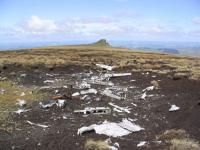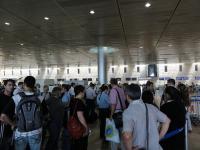-
Search lead by Egypt's military finds plane wreckage north of Alexandria

An Egypt-led search has uncovered “wreckage” and “personal belongings of passengers.” “Egyptian aircraft and navy vessels have found personal belongings of passengers and parts of the wreckage 290 kilometers (180 miles) north of Alexandria,” Egyptian army spokesman Mohammed Samir in a statement published on Facebook. Thursday’s even is but the latest in a troubling series of aviation crises in Egypt this past year.
-
-
Israel’s airport security model may not be suitable for European airports

Israel has a justified reputation as a country offering tight aviation and airport security. Thus, although Israel has been the targets of various forms of terrorism for decades, no one has been killed or wounded inside Ben Gurion airport, or on board an aircraft departing from the airport, for the last forty-four years. Experts say that Europe cannot emulate all aspects of Israel’s approach to aviation security, but that the core idea — that potentially higher risk passengers should be singled out as early as possible before they board the plane – should be adopted, subject to European laws and norms.
-
-
Man who forcibly pulled off woman's hijab during flight pleads guilty

Gill Payne, 37, on Friday pled guilty to using force to obstruct the religious freedom of a Muslim woman, who was identified in court by the letters KA. In December 2015, Payne was on a SouthWest Airlines plane flying from Chicago to Albuquerque. He noticed a woman sitting a few rows ahead of him, wearing a hijab. Witnesses said that he got out of his seat, walked down the aisle toward her, grabbed the hijab to expose her head, and shouted, “Take this off. This is America.”
-
-
FAA expands initiative to detect unauthorized drones near airports
The Federal Aviation Administration (FAA) is expanding the part of its Pathfinder Program that focuses on detecting and identifying unmanned aircraft systems (UAS) flying too close to airports. The FAA says that the other day the agency signed Cooperative Research and Development Agreements (CRDAs) with Gryphon Sensors, Liteye Systems Inc., and Sensofusion. The FAA will evaluate procedures and technologies designed to identify unauthorized UAS operations in and around airports.
-
-
Japan’s successful earthquake early warning system offers lessons to U.S. high-speed rail
As California and other states move forward with high-speed rail plans, some have questioned the system’s ability to withstand earthquakes. This is especially critical in California, an active quake zone. A recent research report says that valuable lessons are easily adapted from Japan’s successes with its early earthquake warning (EEW) systems. This was most recently demonstrated during the series of violent quakes that shook Japan in mid-April, 2016.
-
-
Mathematician escorted off flight for doing notepad calculations
Professor Guido Menzio, an Italian-born economics professor at the University of Pennsylvania, was escorted off an American Airlines flight after a fellow passenger became suspicious of his mysterious scribbling on a notepad. Menzio was, in fact, working on an equation on price-setting, which was part of a presentation he was going to make in professional conference.
-
-
Vertical-take-off-and-landing personal aircraft to beat rush-hour traffic
A German start-up company is developing the world’s first vertical takeoff and landing aircraft for personal use. The electric two-seater will open the door to a new class of simpler, quieter, and environmentally friendly planes available from 2018. The plane is classed as a Light Sport Aircraft for two occupants, with the pilot’s license requiring twenty hours’ minimum training – almost like taking a driving license.
-
-
Airflow study to be conducted in NYC Subway
The Department of Homeland Security (DHS) Science and Technology Directorate (S&T) will conduct a week-long airflow study in portions of the New York City (NYC) subway system to gather data on the behavior of airborne particles in the event contaminants were released. This study poses no risk to the general public and will run from 9 to 13 May.
-
-
Air rage a product of class difference
We blame air rage on long flight delays, shrinking seats and a general decline in civility. But the first empirical research study into the phenomenon pegs another culprit — class inequality — for the reason passengers lose it when taking to the so-called friendly skies.
-
-
Improving detection of concealed nuclear materials

Researchers have demonstrated proof of concept for a novel low-energy nuclear reaction imaging technique designed to detect the presence of “special nuclear materials” — weapons-grade uranium and plutonium — in cargo containers arriving at U.S. ports. The method relies on a combination of neutrons and high-energy photons to detect shielded radioactive materials inside the containers.
-
-
Employees in only three U.S. airports subject to security checks
Only three airports in the United States — Atlanta, Miami, and Orlando — require employees to be subjected to security checks before going about their work at the airport. The disclosure was made by TSA administrator Peter Neffenger in a Congressional testimony.
-
-
American Airlines cancels all Brussels flights until 7 April
American Airlines announced it has canceled all flights to and from Brussels until 7 April. The carrier’s decision is in response to the 22 March suicide bombing attack at the Brussels airport. The explosion occurred near the American Airlines counter, and some of the thirty-two people killed in the blast were about to board an AA flight.
-
-
American Airlines cancels all Brussels flights until 7 April

American Airlines announced it has canceled all flights to and from Brussels until 7 April. The carrier’s decision is in response to the 22 March suicide bombing attack at the Brussels airport. The explosion occurred near the American Airlines counter, and some of the thirty-two people killed in the blast were about to board an AA flight.
-
-
Sniffing out a dangerous vapor for detecting fuel leaks, fuel-based explosives
Alkane fuel is a key ingredient in combustible material such as gasoline, airplane fuel, oil — even a homemade bomb. Yet it is difficult to detect and there are no portable scanners available that can sniff out the odorless and colorless vapor. Engineers have developed a new type of fiber material for a handheld scanner that can detect small traces of alkane fuel vapor, a valuable advancement that could be an early-warning signal for leaks in an oil pipeline, an airliner, or for locating a terrorist’s explosive.
-
-
Terrorists have been targeting transportation hubs for decades

More than 7,400 terrorist attacks worldwide between 1970 and 2014 targeted some form of transportation, including airports and aircraft, representing 5.3 percent of all terrorist attacks. More than 460 targets of terrorist attacks between 1970 and 2014 were airports, representing 6.4 percent of all transportation targets. More than 130 targets of terrorist attacks between 1970 and 2014 were subway systems, representing 1.9 percent of all attacks on transportation targets.
-
More headlines
The long view
New Technology is Keeping the Skies Safe
DHS S&T Baggage, Cargo, and People Screening (BCP) Program develops state-of-the-art screening solutions to help secure airspace, communities, and borders
